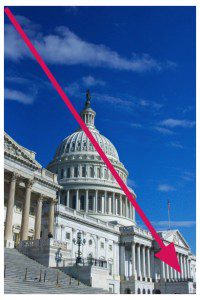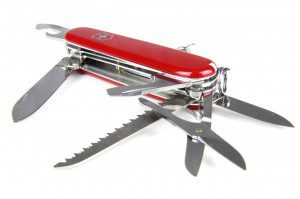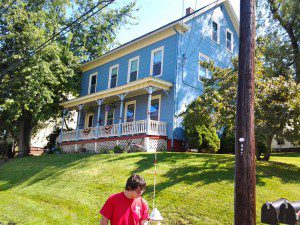Articles republished here help to define and illustrate the nature of the household political economy. Since I will add articles over time, it may become quite long.
How to Short the Welfare State: Invest in the Household Economy
Originally published on Patheos, February 3, 2016

When you think about the economy you probably only include your household as an afterthought.
The economy is big, and your household is small. The economy includes markets, factories, currency, and monetary policy. When it comes to your household economy you probably think is begins and ends with keeping a budget.
It may strike you as odd that people once thought that the economy centered on households. The very word tells that tale. It’s derived from two Greek words, oikos and nomos–house law, or household management. We’ve anglicized them to get the English word, economy.
Households lost their pride of place in the order of things with the rise of factories and the corporations that owned them. Used to be that households were the center of productive enterprise. They held farms, small businesses, and the leading houses actually governed territories. That’s what royal houses were for.
But when the center of productive enterprise moved out of the house, households were down-graded and repurposed. They became “havens in a heartless world”, places to escape from work, to relax, and be with the people you love. For a time they retained their social welfare functions, but these days even those are largely farmed out to daycare centers for children and the elderly. Now no one is at home during working hours.
Recovering Home Economics
I’m old enough to remember something called, “Home Economics”. But it was on its last legs then. Girls, and it was all girls, were taught how to cook and sew by matronly women with hair buns. These girls were made to feel ashamed of themselves for their domesticity though and the curriculum was soundly mocked. All the bright and ambitious girls wanted to compete with the boys in the “real” economy, not complement them at home.
What we’ve seen replace the productive household economy is something I call the recreational household. It is entirely centered on personal fulfillment and is governed only by taste. It is because of this shift that it is nearly impossible to defend traditional marriage. Because households are centers of consumption, de gustibus non disputandum est — in matters of taste there can be no disputes. Even having children is a lifestyle choice these days.
But the institutions that we have made to replace the household economy are failing. The reasons they seemed viable for so long is the cultural momentum of the old household economy. We wrongly assumed it would always carry us forward. But home-truths no longer persuade. Now the magical-thinking and unsustainable practices of big business and the welfare state pass for common sense. Why have kids? Debt? Schmet. And these don’t even account for the contempt by the global elite for borders. Think you can have a welfare state without sound borders? Good luck with that.
We can see two possible futures for the welfare state. Either we will all end up like Greece, or like Japan. The bane of both is debt. The difference is Japan thinks robots will save them. Greece is run by Greeks, so it doesn’t have robots, or a solution.
Reality is not up for a vote. The Bible takes the household for granted in the same way it takes trees and wheat for granted. It even shows us that the cosmos itself is a household, governed by a heavenly father and his heir, the Son of God. Our economies should reflect that economy. If they don’t, they will fail.

How I’m Shorting the Welfare State
I’ve mentioned before in this blog that I’m shorting the welfare state. That means I’m investing in things that will go up in value when the welfare state bubble bursts. I’m not talking about gold, or running off to Montana and living in a bunker. I’m not a “prepper”, at least not in the way most people think about prepping.
I’m investing in small, local institutions. And at the center of my strategy is the household.
Households have been losing value since the Industrial Revolution. They’ve been overwhelmed by the scale and efficiency of industrial output. But what households lack when it comes to specialization and efficiency, they make up for in flexibility and sustainability. The modern economy is like a garage full of tools each of which can only do one thing. A household when it is put to work is more like a Swiss Army knife; it’s a multipurpose institution.
But this doesn’t mean moving back to the farm. I like family farms and we need more of them. But we can’t all go back, and we shouldn’t. There is a decentralization process in the modern economy that I think makes a modified form of household economy possible. I see the seed of it everywhere. I am actually very bullish on the future. If the new technologies come home, and we see a re-centering of productive property in households, the future is household friendly. I even see traditional gender-roles coming back. The new economy will alter them somewhat, but they will look more like their traditional counterparts than the gender-bender stuff we see today.
Reviving the household economy will take a lot of work. Just because the household economy has been devalued doesn’t mean getting it back will come cheap. But as the old saying goes, The cost of living is high, but it’s worth it.
An Introduction to Productive Property

Originally published on Patheos, January 11, 2016
Most people classify themselves as middle-class. This is interesting for at least a couple of reasons.
First, economists tell us the middle-class is shrinking. You’d never know that by the polls though. Admitting that you’ve dropped out of the middle-class is like admitting you have herpes. Conversely, confessing that you’ve risen out of it comes off as self-congratulatory, or even contemptuous toward those you’ve left behind. (That doesn’t mean you don’t congratulate yourself inwardly, or feel contempt for others, you just don’t own up to the reason for these feelings.)
The second reason this is interesting though is because by the standards of antiquity the middle-class hardly exists anymore.
Welcome to the Proletariat, Comrade.
Use the word “proletariat” and people assume you’re a Marxist. That’s too bad, because it is hard to imagine a word that better serves the interests of genuine social conservatives.
The word was coined in Rome, not by Marx, and it meant, “freemen without property”. It was as low as you could go without being a slave. And by Roman standards, that’s most of us today.
In our contemporary economy we’ve redefined middle-class to mean middle-income. It really doesn’t matter how you get your income, just that it can fit into a broad middle-range of income that people receive.
For the ancients, and again in the latter medieval and early modern eras, how you got your income was more important than the amount you received.
Property isn’t all the same
Today, when we think of property, we lump it all together–everything from your toothbrush to uncle Bernie’s duplex goes into the same pot. But toothbrushes and duplexes are different for one huge reason. A toothbrush keeps your teeth white, but a duplex can put money in your pocket. (I suppose a toothbrush can do that too if you’re a model…but hopefully you get my point.)
When Locke, and other classical liberals, spoke of “life, liberty, and property” they didn’t have toothbrushes in mind when it came to property. They were thinking more about duplexes.
Property should be broken down into at least two classes then–personal property and productive property, sometimes referred to as real property. (I don’t like term real property so much; you’ll see why in a moment.)
Almost all the property the people we call middle-class own is really personal property–even their real estate.
Here’s why–if these people were to lose their jobs tomorrow, they’d have to sell these things if they wanted to support themselves by their property. Naturally, this could only go on for so long. Even a person like Mike Tyson runs out of stuff to sell eventually. (Even real property, such as a house, because you can’t live in it and rent it out at the same time.)
Productive property supports you through owning it, not by selling it. That duplex I mentioned is a good example. The income from the rents can feed you.
Productive property takes other forms. Maybe you own a business, or you’re a limited partner in an LLC, or maybe you own intellectual property that produces income, or perhaps you even have enough dividend generating stock in a large corporation to live off of.
Generally, productive property takes work to cultivate income from. It isn’t easy street. And that’s why we lost it. Before the industrial revolution, most Americans derived their livings from productive property. But innovators like Henry Ford came along, and using mass production to push small producers out of business, our society was transformed from one of free-holding producers to one made up of wage-slave consumers.
Wage-slavery and the servile spirit
Most folks today are well-fed serfs. Instead of toiling away in the fields of feudal Lords, they shuffle paper in the cubicle farms of modern corporations. And just as medieval serfs were abased by their dependence, so it is today. We do allow certain silly expressions of self-owership, mostly in matters that our corporate overlords don’t care about–our sex lives (so long as it’s on our own time) or our musical tastes (so long as we keep the headphones on).
But when things spill over into “the work-place” and compromise business, there’s zero tolerance for displays of personal freedom.
And now you know why freedom really is based on property, but a particular sort of property–productive property. This, by the way, is the reason why the Founding Fathers believed that the franchise should be limited to owners of land. Land, being productive property, tends to encourage republican virtues.
Productive property has a way of shaping us, but the virtues it encourages–delayed gratification, thrift, honesty, fair-dealing, and so on–give us a greater measure of self-mastery and self-respect.
What does this mean for our culture, our churches, and our Christianity?